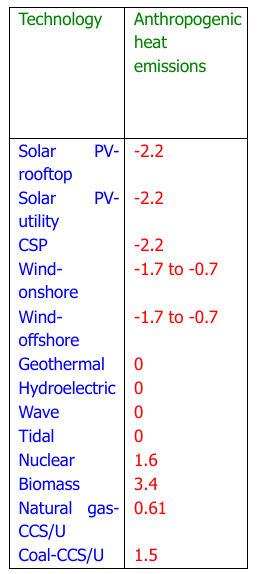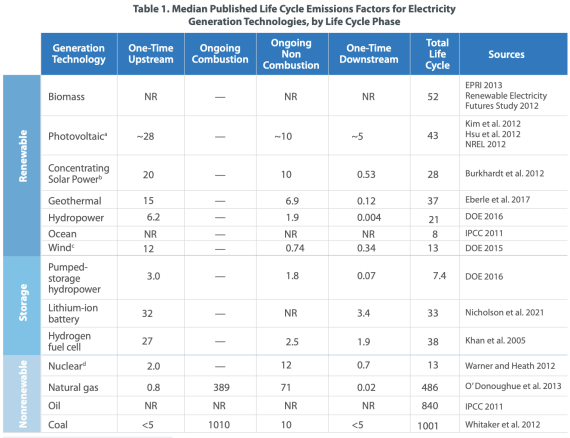Is solar energy worse for the climate than burning fossil fuels?
What the science says...
The lifecycle emissions of solar energy are far lower than fossil fuel sources, with the emissions of coal being 23 times greater than solar PV while the emissions of natural gas are 11 times greater than solar PV.
Solar energy is worse for the climate than burning fossil fuels
"It is likely that solar farms are making climate change worse." (How Solar Affects YOU!)
There is overwhelming evidence that the lifecycle emissions1 of solar energy are far lower than those of all fossil fuel sources, including natural gas2. On average, it takes only three years after installation for a solar panel to offset emissions from its production and transportation. Modern solar panels have a functional lifecycle of 30–35 years, allowing more than enough time to achieve carbon neutrality and generate new emissions-free energy3.
A National Renewable Energy Laboratory (NREL) report released in 2021 examined “approximately 3,000 published life cycle assessment studies on utility-scale electricity generation from wind, solar photovoltaics, concentrating solar power, biopower, geothermal, ocean energy, hydropower, nuclear, natural gas, and coal technologies, as well as lithium-ion battery, pumped storage hydropower, and hydrogen storage technologies.” The report found widespread agreement that all modes of solar power have total lifecycle emissions significantly below those of all fossil fuels. The report found specifically that the total lifecycle emissions for solar photovoltaic (PV) and concentrating solar power (CSP) panels were 43 and 28 grams of CO2-eq/KWh (carbon dioxide-equivalents per kilowatt-hour), respectively. Coal, by contrast, generated lifecycle emissions of 1,001 grams of CO2-eq/KWh, and natural gas generated lifecycle emissions of 486 grams of CO2-eq/KWh.
Figure 1: Total lifecycle emissions for different energy sources. Source: NREL.
To be fair, there are some outlier studies. For example, one study examined a worst-case scenario in which the coal-powered manufacture of inefficiently sized solar PV cells may contribute to greater lifecycle emissions than the cleanest and most efficient fossil fuel plants (Torres & Petrakopoulou 2022). However, the conclusion that solar is worse for the climate than fossil fuels is not backed up by NREL’s more extensive survey.
In addition to having smaller greenhouse gas emissions, solar power likewise outperforms fossil fuels in minimizing direct heat emissions. A 2019 Stanford publication notes that, for solar PV and CSP, net heat emissions are in fact negative, because these technologies “reduce sunlight to the surface by converting it to electricity,” ultimately cooling “the ground or a building below the PV panels.”4 The study found that rooftop and utility-scale solar PV have heat emissions equivalent to negative 2.2 g-CO2e/kWh-electricity, compared to the positive heat emissions associated with natural gas, nuclear, coal, and biomass.

Figure 3: The 100-year CO2e emissions impact associated with different energy sources’ heat emissions, measured in g-CO2e/kWh-electricity. Source: M.Z. Jacobson (reproduced and adapted with permission)
Looking at academic scholarship from outside of the United States, a 2022 analysis from India’s Hirwal Education Trust’s College of Computer Science and Information Technology describes the global impact of solar panel heat emissions as "relatively small".5
Footnotes:
[1] Lifecycle emissions for energy technologies encompass emissions associated with the operation of an energy facility, such as combustion of fossil fuels. Lifecycle emissions also encompass upstream emissions associated with resource extraction, manufacturing, and construction of a facility, along with downstream emissions associated with decommissioning of a facility. And: Nat’l Renewable Energy Laboratory, Life Cycle Greenhouse Gas Emissions from Electricity Generation: Update (Sept. 2021) (Table 1). NREL calculates emissions intensity using grams of carbon dioxide equivalent per kilowatt-hour.
[2] Steffen Schlömer et al., 2014: Annex III: Technology-specific Cost and Performance Parameters, Climate Change 2014: Mitigation of Climate Change 1329, 1335 (2014); Carbon Footprint of Solar Panel Manufacturing, Cool Effect (June 1, 2021)
[3] What Is End-of-Life Management for Photovoltaics?, U.S. Dep’t of Energy Solar Energy Tech. Office (last visited March 25, 2024).
[4] Mark Z. Jacobson, Evaluation of Nuclear Power as a Proposed Solution to Global Warming, Air Pollution, and Energy Security, Dec. 22, 2019.
[5] Sudesh Nagu Kadam et. al, Solar Panel Heat Emission and Its Environmental Impact, 2 Int’l J. Advanced Rsch. Sci. Commc’n Tech. 3 (Dec. 2022), 113, 116.
[Note June 7, 2025: updated one or more link(s) to archived version(s)]
This rebuttal is based on the report "Rebutting 33 False Claims About Solar, Wind, and Electric Vehicles" written by Matthew Eisenson, Jacob Elkin, Andy Fitch, Matthew Ard, Kaya Sittinger & Samuel Lavine and published by the Sabin Center for Climate Change Law at Columbia Law School in 2024. Skeptical Science sincerely appreciates Sabin Center's generosity in collaborating with us to make this information available as widely as possible.
Last updated on 7 June 2025 by Sabin Center Team. View Archives































 Arguments
Arguments






























Climate Myth...